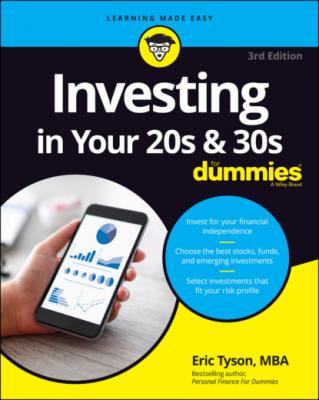Investing in Your 20s & 30s For Dummies. Eric Tyson
Чтение книги онлайн.
Читать онлайн книгу Investing in Your 20s & 30s For Dummies - Eric Tyson страница 8

I designed and wrote this book to help you with the important and challenging task of investing. Your young adult years are a crucial and ideal time to lay the best foundation for investing wisely. After all, some of the investments you make now and in the near future will have decades to grow and multiply.
I talk some simple numbers here to get you excited and motivated. Stocks in the United States historically have returned an average of about 9 percent per year. At that rate of return, you will double your money every 8 years. So, in 16 years, your money will be up four times, in 24 years, your money will be up eight times and in 32 years, you money will be up 16 times. Wow! This means for every $1,000 you can invest in your 20s, you could have about 16 times that amount by your 50s and be on the road to financial independence. The more you can save and intelligently invest in your younger adult years, the quicker you will reach the land of financial independence.
I’ve worked with and taught people from widely varying financial situations, so I know the investing concerns and questions of real folks just like you. I’ve seen how important having healthy and strong personal finances and investments is.
I first became interested in money matters as a middle-school student when my father was laid off from his employer and received some retirement money. I worked with my dad to make investing decisions with the money. A couple of years later, I won my high school’s science fair with a project on what influences the stock market.
During my younger adult years, I worked hard to keep my living expenses low and to save and invest money so I could leave my job and pursue my entrepreneurial ideas. I accomplished that goal in my late 20s. I hope to give you some tools to help you make the most of your money and investments so you too can meet your goals and dreams.
This book is basic enough to help a novice get their arms around thorny investing issues. But advanced readers will be challenged as well to think about their investments and finances in a new way and identify areas for improvement. Check out the table of contents for a chapter-by-chapter rundown of what this book offers. You can also look up a specific topic in the index. Or you can turn a few pages and start at the beginning: Chapter 1.
Foolish Assumptions
No matter what your current situation is — whether you’re entering the job market right after high school, graduating college with substantial student loan debt, feeling pretty well established in your career, and so on — I thought of you as I wrote this book and made some assumptions about you:
You want expert advice about important investing topics such as getting a preinvesting financial checkup, understanding the range of investments available, and assembling a killer investment portfolio. And you want that advice quickly.
You want a crash course in investing and are looking for a book you can read cover to cover to help solidify major concepts and get you thinking about your investments in a more comprehensive way.
You’re tired of feeling overwhelmed by your investing choices and stressed out by the ever-changing economic and investing landscape, and you want to get more comfortable with your investment selections.
Icons Used in This Book
The icons in this book help you find particular kinds of information that may be of use to you:
Beyond the Book
In addition to the material in the print or e-book you’re reading right now, this product comes with a free access-anywhere Cheat Sheet that helps you get started with investing. To view this Cheat Sheet, simply go to www.dummies.com and enter “Investing in Your 20s & 30s For Dummies Cheat Sheet” in the Search box.
Where to Go from Here
This book is organized so you can go wherever you want to find complete information. You can use the table of contents to find broad categories of information or the index to look up more specific topics.
If you’re not sure where you want to go, you may want to start with Part 1. It gives you all the basic info you need to assess your financial and investing situation and points to places where you can find more detailed information for improving it.
Part 1
Getting Started with Investing
IN THIS PART …
Define commonly used investing jargon, including explaining the different types of investments.
Use investments to accomplish your goals, such as making larger purchases, buying a home, and investing for retirement.
Understand expected investment returns and risks.
See how investment returns are taxed and what you can legally do to minimize your taxes on your investments.
Chapter 1
Making Sense of Your Investing Options
IN THIS CHAPTER
So many subject areas and disciplines are packed full of jargon. Some of this is the result of “progress” and advances, and some of it is caused by workers